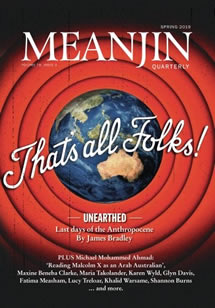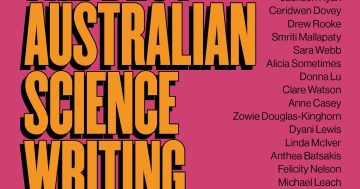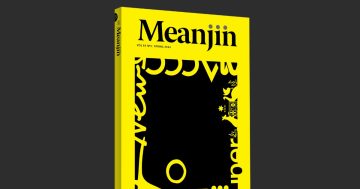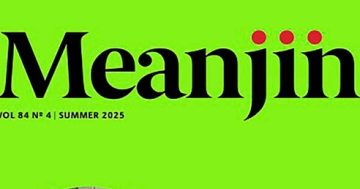Reviewed by Rama Gaind.
Edited by Jonathan Green, Melbourne University Publishing, $24.99.
 It’s not possible to imagine a subject more urgent or demanding of our attention than the one written about by James Bradley. In the lead essay Unearthed: Last Days of The Anthropocene, Bradley writes compellingly on the urgent crisis of climate change.
It’s not possible to imagine a subject more urgent or demanding of our attention than the one written about by James Bradley. In the lead essay Unearthed: Last Days of The Anthropocene, Bradley writes compellingly on the urgent crisis of climate change.
In fact, editor Green points out in the editorial that Bradley’s work follows a tradition set by Rachel Carson in 1962. It was Carson’s Silent Spring that “joined the dots of humanity’s poisoning of the biosphere – you will still find DDT in breastmilk – but also suggested a reframing of the human place in the biosphere. She placed personkind as an interdependent component of broader nature; no longer a species apart, but a species with the singular capacity to alter that universal, shared ecology”.
“This new law of human action and consequence could work for good or ill, and Carson’s writings gave rise to a new era of environmental activism and stare action. Government framed new law and regulation, chemicals were proscribed.”
“We confront a crisis in which humanity is culpably implicated. As James Bradley writes in this edition, ‘the arithmetic of climate change is utterly inexorable’ and yet: ‘Although we talk about the climate crisis we don’t really talk about it. I’m not sure we even know how’.”
Bradley’s work picks up Carson’s custom of locating humanity as a transformative agent in the biosphere. He details these seemingly terminal, warming years of the Anthropocene in a piece of writing that takes our dread and gives it form, that finds the words to frame this existential crisis in a way that makes the imperative for action clear.
In Unearthed James Bradley points out, “there is a conversation I do not know how to have, a conversation about what happens if we are headed for disaster. It is not a theoretical question for me. I have two daughters”.
“Perhaps it is only by imagining the end of the world that we can begin to imagine the end of capitalism. Perhaps it is only by imagining the end of the world that we can begin to imagine a better one.” There is a lot at stake.
In another contribution, Miles Franklin shortlisted-author Michael Mohammed Ahmad writes on how his thinking about literature, politics and race was shaped in Reading Malcolm X in Arab-Australia. In an accidental companion piece, This Vast Conspiracy of Memory, Khalid Warsame reflects on life and writing while making a complete reading of the works of James Baldwin.
Meanjin #78.3 is another great collection of new Australian writing that covers an impressive array of essays, memoir, short fiction and poetry.











